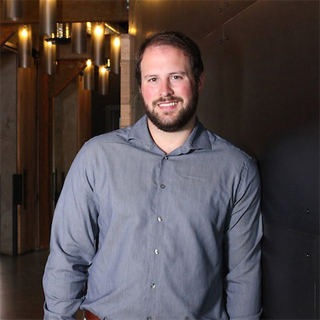[Editor’s note: This post is part of a continuing series on how writers craft words to express their ideas and to connect with readers. The interview with Mr. Bruno was conducted by Miriam Ruff on June 6, 2019, and is divided in two parts. It has been lightly edited for length and clarity.]

MR: Welcome to AceReader. Let’s begin at the beginning. Most writers started out as readers, and I assume that applies to you. How old were you when you learned to read? Did your parents get you going, did you learn in school, did you discover it on your own, or some combination thereof?
RB: This is funny. I actually wasn’t a huge reader from like, middle school to high school. The required reading sort of turned me off after I loved books like Narnia and Merlin. I didn’t really rediscover it until reading The Road as a senior in High School. From there I started reading a lot of the Golden Age Sci-fi classics and found my passion there.
MR: What were your reading habits growing up? Did you go to the library often? Book stores? Rummage sales?
RB: By the time I really got back into it, I discovered a kindle and much prefer reading digitally. I’ve never been a fan of any type of store, and am happy to buy e-books rather than rent.
MR: You mention on your website that you’ve always enjoyed reading science fiction. How old (or young) were you when you realized your interest? Who did you read, and why? What attracted you to them? Are you attracted to different writers now that you’re a well-established author?
RB: I guess I was 17. I really got into reading all the EU [Editor’s note: Extended Universe] Star Wars books by Timothy Zahn, etc., and from there moved on to the classics like Heinlein, Philip K Dick. Nowadays, I co-run a publisher so I mostly read books that are submitted or that I edit.
MR: Do you think your reading habits influenced your decision to become a writer? What were your stories like as you were growing up – were there particular themes or plots that attracted you? Do they still attract you?
RB: They’ve always been separate for me. Now that I am a writer, I see reading sort of as research for my own work, as far as how to tell a story, phrases, character arcs, etc. But I was always drawn to darker stories where there aren’t clear villains or heroes. Gray morality. They still absolutely attract me in all mediums, and tend to be what I write.
MR: You also mention on your site that you didn’t start your first novel until high school. What made you decide that was the right time to start?
RB: I mean, I had been writing forever. It’s something I was always into, crafting stories. In my head, I view them as movies, games. I think any form of storytelling is research for writing. I’ve learned as much about storytelling (what to do and what not to do) from video games as reading. So at a certain point, the little stories I’d write evolved into me trying a book. It was sort of organic.
MR: Even with that novel, you didn’t start with a writing major in college: “It wasn’t until I was a senior that I decided to finally pursue my passion for Science Fiction.” What decided you to do that?
RB: I mean this more in that before then I wrote epic fantasy mostly. But after really dedicating myself to reading some classics, I found that I enjoyed writing Sci-fi more. The way I could project futures, tell relevant stories too today. It just really clicked. But, up until recently, writing was always a side-thing.
MR: What was your first published work, and where did it appear?
RB: My first published work depends on how you classify that. At 17 I was swindled by one of the vanity presses of the time (defunct now and with its owners in jail!) and they published my first fantasy series. But later on, Mundania Press published my sci-fi debut The Circuit: Executor Rising, which was then bought by Diversion Books.
MR: Do you have to do a lot of research for your novels and stories? I imagine the worldbuilding must be pretty intense to span multiple books in a series and stay consistent.
RB: Depends on the genre. For fantasy, it’s pretty easy to roll with made up things beyond googling weapons. Sci-fi is tougher. Sometimes there is physics to work out, materials, future technologies. It can be tiresome, but, I tend to focus more on story and characters than the hard science to an extent.
MR: What is your process for starting a new work? What keeps you motivated until you’ve completed it?
RB: I usually sit on it and outline completely in my head, with a few major notes written on my Iphone’s notes app. I don’t start until the story in my head feels right. Then, typically, I can’t not finish anything I start once I get a few chapters in. It’s very OCD hah.
MR: You recently studied screenwriting to perhaps pursue TV and video game work. Do you think that always learning something new, doing something different, are important things for all writers?
RB: I think so. Expanding horizons. I learned a TON about storytelling structure in those lessons. So even if they lead to nothing, they’ve made me a far better writer. Again, they’re different mediums, but they’re all storytelling.
Next week: Rhett Bruno, Part 2

1 thought on “Authors, Developing Words – Rhett Bruno, Part 1”